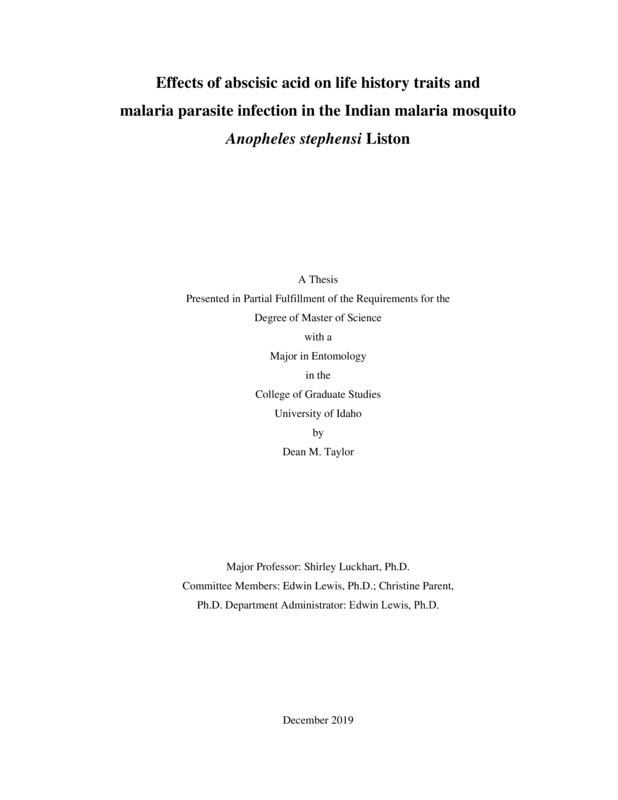Effects of abscisic acid on life history traits and malaria parasite infection in the Indian malaria mosquito Anopheles stephensi Liston
Taylor, Dean. (2019-12). Effects of abscisic acid on life history traits and malaria parasite infection in the Indian malaria mosquito Anopheles stephensi Liston. Theses and Dissertations Collection, University of Idaho Library Digital Collections. https://www.lib.uidaho.edu/digital/etd/items/taylor_idaho_0089n_11724.html
- Title:
- Effects of abscisic acid on life history traits and malaria parasite infection in the Indian malaria mosquito Anopheles stephensi Liston
- Author:
- Taylor, Dean
- ORCID:
- 0000-0002-6841-183X
- Date:
- 2019-12
- Embargo Remove Date:
- 2021-01-02
- Keywords:
- Abscisic acid Anopheles Malaria Mosquito
- Program:
- Plant, Soil and Entomological Sciences
- Subject Category:
- Entomology
- Abstract:
-
Larval conditions of holometabolous insects can have a substantial impact on adult life history traits including mortality, fecundity, and pathogen infection. For example, in Anopheles stephensi, overcrowded larval environments has been shown to reduce adult size, decrease fecundity, and increase Plasmodium berghei development. Presently, we are interested in the carryover effects of larval exposure to abscisic acid (ABA) on A. stephensi. ABA was first described as a plant hormone, but is now known for its effects as a stress hormone across animal taxa. We have previously shown ABA transiently alters adult mosquito metabolism through phosphorylation of metabolic mediators in the midgut following a supplemented blood meal. In this study, A. stephensi larvae were exposed to ABA for the entirety of their development and adult females derived from treated or control larvae were evaluated for fecundity, nutrient stores, and life span. Treatment of ABA in larval water significantly increased their development speed, while increasing pupal mortality. We also found that ABA supplementation during larval development has significant carryover effects on adult females, reducing their reproductive output and shortening their lifespan through reduced nutrient acquisition of larvae. Adult mosquitoes exposed to ABA during larval development also have reduced expression of insulin-like peptides (ilps), thus supporting our findings of reduced fecundity and nutrient storage. These findings suggest larval exposure to ABA has the capacity to affect numerous adult life history traits related to vector biology, which could benefit areas with endemic mosquito-borne diseases.
- Description:
- masters, M.S., Plant, Soil and Entomological Sciences -- University of Idaho - College of Graduate Studies, 2019-12
- Major Professor:
- Luckhart, Shirley
- Committee:
- Parent, Christine ; Lewis, Edwin
- Defense Date:
- 2019-12
- Identifier:
- Taylor_idaho_0089N_11724
- Type:
- Text
- Format Original:
- Format:
- application/pdf
- Rights:
- In Copyright - Educational Use Permitted. For more information, please contact University of Idaho Library Special Collections and Archives Department at libspec@uidaho.edu.
- Standardized Rights:
- http://rightsstatements.org/vocab/InC-EDU/1.0/

